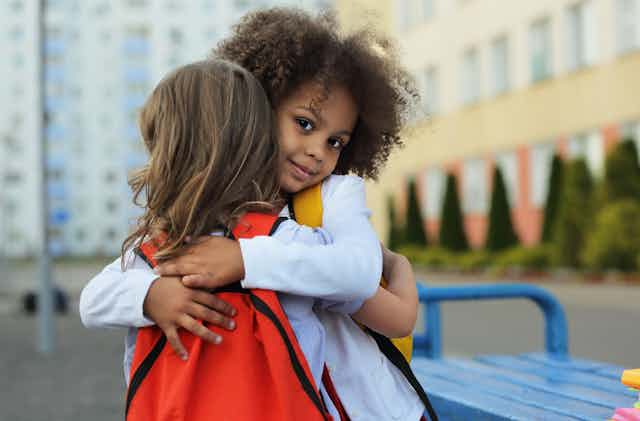From playmates to emotional support, friendships are incredibly important for children at all stages of growing up. For the thousands of children who come to the UK as refugees, a friendly smile from a classmate could make the difference between feeling welcome and feeling excluded.
In the year ending September 2023, many thousands of children, including 4,656 children travelling alone (unaccompanied minors) claimed asylum in the UK.
Many of these children have left war-torn countries, extreme poverty or other dangerous situations. Unaccompanied minors may have lost all of their family in a conflict or been separated from their family in the chaos of crossing a border.
Under the recently passed Illegal Immigration Act, children who arrive in the UK without the appropriate documentation will not be granted permission to stay and could be removed to a third country or returned to their home country, even if they have family in the UK. Although unaccompanied minors have been listed as an exception, it is currently not clear what type of visa or permission to stay they will be granted.
The traumatic experiences that often force children and their families to claim asylum in another country can negatively impact their ability to learn the language and make friends. Many feel isolated and excluded as they try to adjust to a new language and culture.
In my research I conducted therapy sessions with 33 adolescent unaccompanied minors arriving in Ireland from the Middle East, Asia and Africa over a five-year period. I also listened to comments they made while they chose miniature objects to create visual representations (called eco-maps) of the important relationships in their lives.
Friends as family
Displaced children are likely to lose friends when they leave their homes and move elsewhere. At the same time, they are often also moving from childhood to adulthood. This experience has been described by scholars as a “double burden”.
My research participants described the sense of safety they felt when connecting with new friends and the importance of knowing those friends were there for them. They described their friends, including those they had met along the migration route, as their “new family”, “brothers” and “sisters”.
They detailed deep emotional bonds resulting from shared experiences. Amina shared: “When thoughts just keep coming all the time into my head and I can’t stop them, she [my friend] will always be there for me ready to pick up the pieces.”
Mamoud talked about the importance of connecting with friends who have had similar experiences during times of stress, but also of his desire not to overburden them: “I know that they have so much of their own stuff going on so it’s sometimes unfair to talk about mine”. This is where new friends can help.
Many also chose miniature figures to represent God as a friend. Mamoud’s eco-map and narrative illustrate the power of having a proxy family:

I met Aboud when I was running away after the explosion. He’s the soldier with the flag in the picture beside me – I have the sword. I was only 12 years old and he took me into his home as his brother. His whole family accepted me. His mum is the angel horse and his sisters are the princesses – they are still protecting me as a true family member.
Amina said the most important thing happening to her since she arrived was when a girl invited her to sit with her in the canteen:
She came over to me and asked if I would like to sit with her and her friend. I coudn’t get my words out, I was so surprised and then I was nervous that she wouldn’t like me. But she was patient and kind and she invited me every lunch time and now we are friends.
Talking to your children
In Ireland, where I carried out my research, schools in every county are welcoming Ukrainian refugee pupils. In the UK, there are refugees in every local authority area, and over 400 schools have become “schools of sanctuary”, declaring their commitment to creating a culture of welcome and inclusion for refugees.
It is likely that your child will have refugees in their school and maybe their class. There are a number of very simple things parents can do to encourage their children to welcome displaced children rather than emphasising their differences.
It is important to first explain what refugee children may have been through. You can read with or to your children from this reading list, compiled by Children’s Books Ireland and the UN refugee council. It also includes books for older children to read themselves.
Read more: Children’s books on the refugee experience are crucial reading
Talk to your children about the importance of being kind and inclusive to refugee children in their friend group, in class, in sports, or walking to and from school.
You can encourage your child to stand up to racism and discrimination, but kindness does not have to be complicated: one of my participants described how another person smiling at him on the bus “made his day”.
Peer acceptance is critical for children and adolescents to have a healthy adjustment to new contexts, whether that’s a new school or a different country. By encouraging your children to be welcoming and inclusive, you can make a world of difference to the lives of refugee children.

